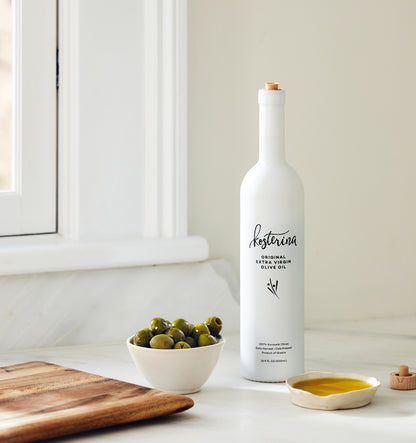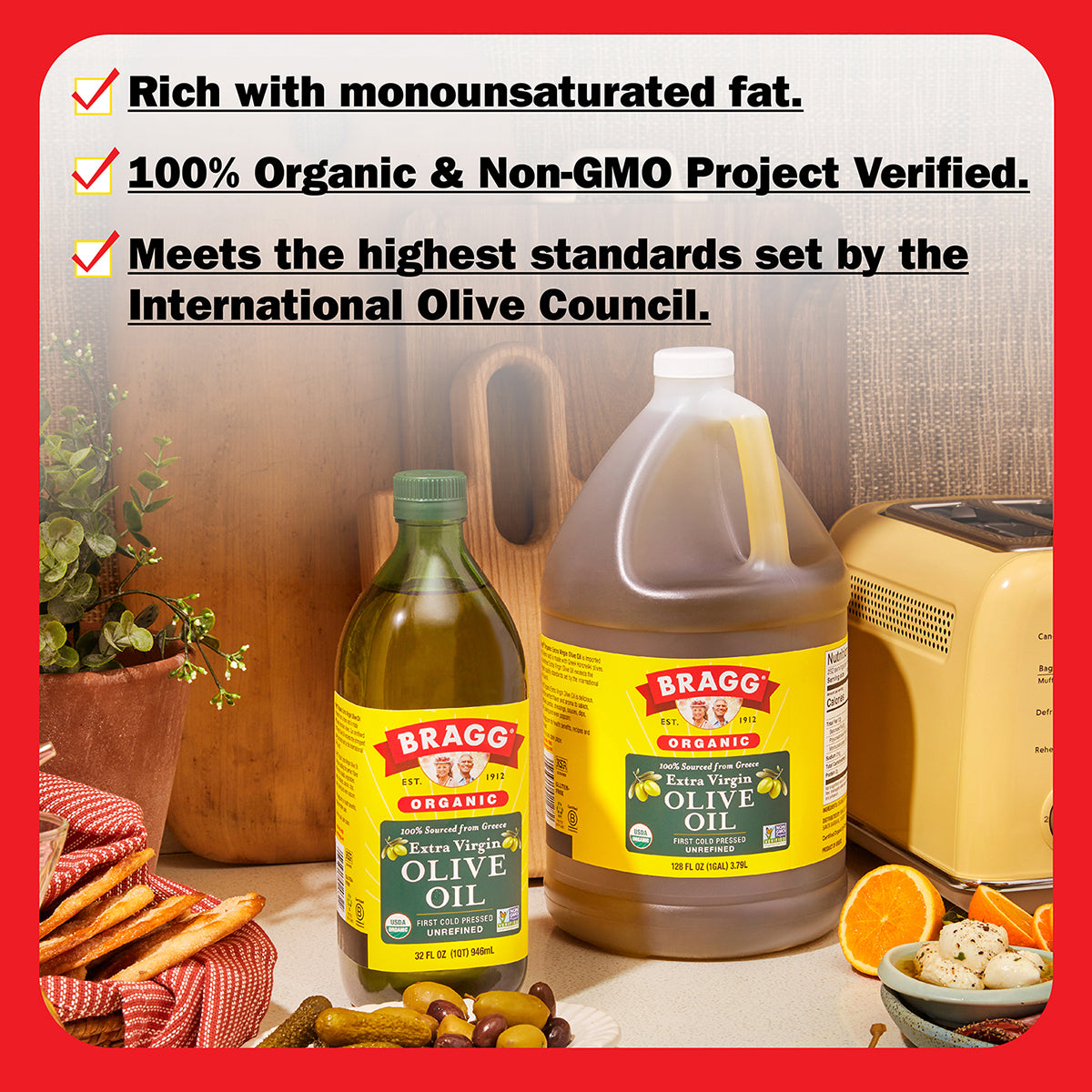Checking Out the Different Sorts Of Olive Oil and Their Usages, Including Bonus Virgin Olive Oil
The exploration of olive oil encompasses a varied variety of kinds, each offering culinary applications and distinctive flavors. Bonus virgin olive oil, renowned for its exceptional quality and health and wellness benefits, works as a staple in numerous cooking areas, yet it is just one facet of this diverse ingredient. extra virgin olive oil benefits. Other ranges, such as pure and polished olive oils, additionally call for attention for their special residential or commercial properties and usages. Understanding these distinctions can significantly affect both food preparation methods and taste profiles. What, then, should one take into consideration when selecting the ideal olive oil for a specific culinary undertaking?
What Is Olive Oil?
Originated from the fruit of the olive tree, olive oil is a staple in Mediterranean cuisine and an essential component in different cooking applications. This functional oil is produced by pressing whole olives, leading to a liquid that varies in scent, taste, and color relying on the kind of olives made use of, the area of cultivation, and the extraction process. Olive oil is predominantly composed of monounsaturated fats, particularly oleic acid, which is understood for its prospective health and wellness benefits, including anti-inflammatory buildings and cardiovascular assistance.
Along with its cooking usages, olive oil has a lengthy background of application in standard medicine and skincare, owing to its rich antioxidant content (extra virgin olive oil benefits). The oil is often used in dressings, sauces, and for cooking approaches such as sautéing and roasting. Its distinctive taste profile can enhance the taste of numerous recipes, making it a necessary component for both home cooks and professional cooks
In addition, olive oil is commemorated for its role in the Mediterranean diet regimen, which is connected with various health and wellness benefits. As recognition of these advantages grows, olive oil remains to get popularity worldwide as a fundamental part of a healthy lifestyle.
Kinds of Olive Oil
Comprehending the various kinds of olive oil is important for both cooking lovers and health-conscious customers. Olive oil is identified mainly based upon its extraction technique and quality, which substantially affects its flavor, fragrance, and health and wellness benefits.

Light olive oil, in spite of its name, describes a lighter flavor and not lower calories. It is ideal for those looking for a much more subtle preference in marinates and dressings. Additionally, there are flavorful olive oils infused with herbs, seasonings, or citrus, which can improve dishes without the demand for extra seasoning.
Each kind of olive oil serves specific cooking purposes, and recognizing these distinctions allows customers to make informed selections that line up with their food preparation styles and health objectives.
Extra Virgin Olive Oil
Additional virgin olive oil (EVOO) is widely considered the best quality olive oil offered, celebrated for its rich taste and various wellness benefits. To be identified as extra virgin, the oil has to be produced from fresh olives making use of mechanical procedures, without the usage of solvents or excessive warm. This meticulous technique maintains the oil's natural tastes, anti-oxidants, and healthy fats, leading to an item with a low level of acidity degree of less than 0.8%.
EVOO is plentiful in monounsaturated fats, specifically oleic acid, which is linked to minimized swelling and improved heart health and wellness. It additionally contains polyphenols, powerful anti-oxidants that might offer protective results versus chronic illness. The taste account of EVOO can differ considerably depending upon the olive selection and area of production, ranging from fruity and verdant to durable and sharp.

Culinary Use Olive Oil

In cooking, olive oil can be made use of for sautéing, toasting, and cooking, supplying a much healthier option to butter or other fats. Its high smoke point makes it ideal for numerous cooking techniques, while its antioxidants contribute to a heart-healthy diet regimen. Showering olive oil over completed meals, such as pasta, fish, or grilled veggies, can raise flavors and add a touch of style.
In addition, olive oil plays a substantial function in baking, where it can change standard fats in recipes for bread and breads, giving wetness and a refined preference. It also functions as a base for instilled oils, allowing cooks to explore flavors such as garlic, natural herbs, or chili, additionally expanding its cooking capacity. Overall, olive oil's flexibility makes it indispensable in both home and specialist kitchen areas.
Choosing High Quality Olive Oil
When selecting top quality olive oil, it's necessary to consider a number of key variables that influence the item's health and wellness, aroma, and flavor advantages. Decide for extra virgin olive oil (EVOO), which is obtained from the initial cold pressing of olives and consists of the highest possible levels of antioxidants and helpful substances. Look for oils that are accredited by acknowledged companies, as this often guarantees adherence to rigid top quality standards.
The packaging likewise plays a considerable duty in maintaining the oil's integrity. Choose oils stored in dark glass bottles or tins to safeguard versus light deterioration. Focus on the harvest day; fresher oils supply superior flavor and nutritional value, so select products that are within 18 months of their harvest.
Additionally, consider the origin of the oil. Premium olive oils commonly originate from certain areas you can try this out understood for their unique taste profiles, such as Italian, Spanish, or Greek oils. Be mindful of the preference; an excellent high quality olive oil must have a balance of fruity, bitter, and peppery notes, indicating its splendor and intricacy. By reviewing these aspects, you can ensure you are choosing the best olive oil for your culinary demands.
Conclusion
In recap, the expedition of various sorts of olive oil exposes distinct characteristics and applications, with added virgin olive oil representing the peak of high quality due to its reduced acidity and high antioxidant content. Its convenience in culinary usages improves tastes in dressings, sauces, and sprinkles. Understanding the various varieties of olive oil permits informed selections in cooking approaches, advertising healthier techniques while enhancing the overall gastronomic experience. Quality choice continues to be vital for optimal advantages.
Derived from the fruit of the olive tree, olive oil is go a staple in Mediterranean cuisine and a crucial ingredient in various cooking applications.The most usual types of olive oil include fine-tuned olive oil, pure olive oil, and light olive oil.Bonus virgin olive oil (EVOO) is extensively concerned as the greatest top quality olive oil readily available, well known for its rich taste and countless health benefits. Choose for additional virgin olive oil (EVOO), which is acquired from the initial cool pressing of olives and includes the greatest levels of anti-oxidants and valuable substances.In recap, the exploration of various types of olive oil reveals distinct qualities and applications, with additional virgin olive oil representing the pinnacle of high quality due to its low acidity and high antioxidant material.
Comments on “Extra Virgin Olive Oil Benefits: The Natural Anti-aging Solution You've Been Searching For”